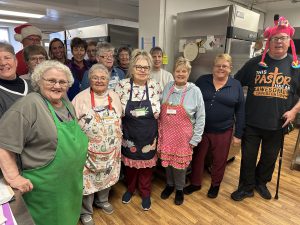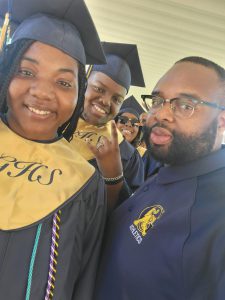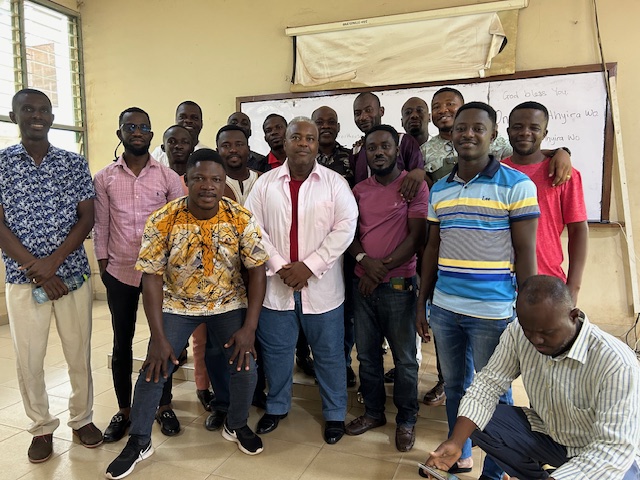At Pittsburgh Seminary, we seek to participate in God’s ongoing mission in the world by seeing and getting to know people as our neighbors. Challenged by Jesus’ parable of the Good Samaritan and inspired by Mr. Fred Rogers ’62, who sang, “I have always wanted to have a neighbor just like you!”, I am writing this blog to introduce you to some of my neighbors—students in our Doctor of Ministry (D.Min.) Program, for which I am honored to serve as the director.
I’d like to introduce you to my neighbor, Dr. Harold V. Bennett. Harold is chair of the philosophy and religion department at Morehouse College and is the ecumenical officer for the South-Central Georgia jurisdiction of the Church of God in Christ. He is an elder in the Church of God in Christ, and he serves as the first administrative assistant to the senior pastor of the Temple of Faith Church of God in Christ and as a visiting instructor at the Ghana Baptist School of Ministry in Kumasi, Ghana.
Harold and his wife, Valerie, launched Pentecost for Life Ministries. He is grateful that the Intergenerational Black Church Studies cohort has significantly enhanced his theological, social, and political understanding. Specifically, he says, “the practical, hands-on exposure to grassroots organizations here in the Western Pennsylvania-Eastern Ohio area, which are actively engaged in social justice work, has equipped me with practical solutions and strategies to address these critical issues and moments in the life of Pentecostal religious traditions worldwide.”
The Lawyer’s Question and Jesus’ Answer (Luke 10:25-37)
Why is Luke’s account of the “who is my neighbor” question so captivating?
First, the quest for eternal life is the backdrop against which we are invited to appreciate this question. The renowned specialist in the law of Moses searched for important information about what it would take to experience a deep and abiding relationship with God—now and in the world to come—and Jesus told him to love his neighbor as he loved himself. Second, Luke 10:25-37 identifies the response of the lawyer to Jesus’ directive. The lawyer replied: “Who is my neighbor?” In response, Jesus tells the lawyer a story about a “Good Samaritan.”
In telling this story, Jesus defines “neighbor” from the angle of “neighborliness.” He reconceptualizes the idea of a “neighbor” and links it to friendly or compassionate behavior toward any person in need and with whom we come into contact. One cannot help but think that the lawyer wanted Jesus to define “neighbor” so this category excluded Gentiles and Samaritans, people for whom he felt no moral obligation to be kind. Instead, Jesus points out that neighbors are all those human beings—regardless of ethnicity, religious ideology, gender, or socioeconomic status—whom the lawyer is blessed with the opportunity to help and to demonstrate compassion toward.
Jesus defines “neighbor” from the angle of “neighborliness.” He reconceptualizes the idea of a “neighbor” and links it to friendly or compassionate behavior toward any person in need and with whom we come into contact.
A Vibrant City With Many Zones
Atlanta, Ga., is beautiful place. My neighbors are creatures made in the Imago Dei whom I have the blessing of serving in different “zones” of the city.
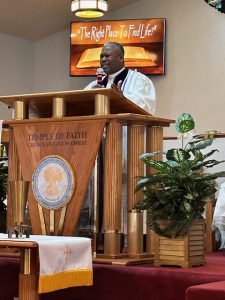
One zone is the church, and one group of my neighbors are Pentecostals. I am the first administrative assistant to the senior pastor in my Holiness-Pentecostal congregation. One hundred eighty members are on roll at my local church. The worship is spontaneous and vibrant. Musicians employ drums, organs, tambourines, and other instruments in the music of the worship services. Who is my neighbor? Well, they are people who may scream for joy, dance, start praying, give me a word from the Lord, or raise their hands at any minute, when they gather to worship God. My neighbors are Pentecostals.
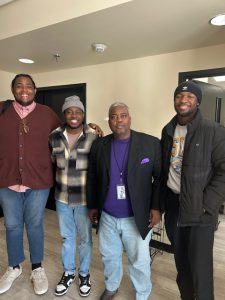
Another zone is the academy, and my neighbors are students at the Atlanta University Center and in Kumasi, Ghana. On the one hand, my neighbors are African American males at Morehouse College. I am a professor at Morehouse College and have the excellent opportunity to show kindness to young men, ages 18 to 22, who come from diverse socioeconomic backgrounds. These men come from all over the world. Some come from sub-Saharan West Africa. Some come from the Caribbean. These men seek to become entrepreneurs, physicians, lawyers, theologians, pastors, and scientists while learning about Dr. Martin L. King Jr., Howard Thurman, and Dr. Benjamin Elijah Mays. These men are Republicans, Democrats, Libertarians, and Independents. These men are Christians, Buddhists, Muslims, practitioners of African Traditional Religions, and Atheists.
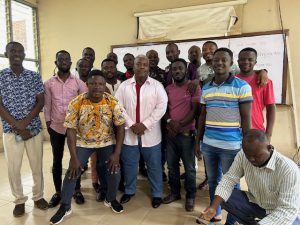
My neighbors are students at the Charles H. Mason Theological Seminary. These seminarians are male and female. They are bi-vocational pastors and are working hard to obtain a graduate theological education. One the other hand, my neighbors are students in Kumasi, Ghana. I spend time during the summers teaching classes at the Ghana Baptist School of Ministry, and this experience provides me with the opportunity to be a neighbor in an international context. What a motley crew! My neighbors are students of various stripes at the Atlanta University Center and in the world.
My neighbors are students, teachers, professionals, and administrators at the Burgess-Peterson Academy. These students are K-5th grade. My neighbors are young faces six to 11 years old. My neighbors are social workers and principals. I have the excellent opportunity to practice neighborliness to students and families who may need some extra love during certain times in the year. These young minds are little sponges, which is wonderful. My neighbors are students at the Burgess-Peterson Academy.
Many Neighborhoods, Many Neighbors
God has blessed me with the excellent opportunity to serve and show compassion toward Pentecostals, undergraduate and graduate students, elementary school students, administrators, and social workers.
The academy and the church are my neighborhood. Local and international students, and Holiness-Pentecostal Christians, are my neighbors. Welcome to my neighborhood.
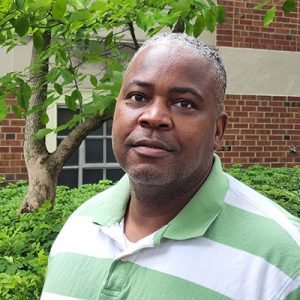 Dr. Harold V. Bennett is chair of the philosophy and religion department at Morehouse College, ecumenical officer for the South-Central Georgia jurisdiction of the Church of God in Christ, visiting instructor at the Ghana Baptist School of Ministry, and the first administrative assistant to the senior pastor of the Temple of Faith Church of God in Christ. He has spoken on religion and social ethics on National Public Radio and other radio programs. With his wife, Valerie, he launched the Pentecost for Life Ministries. Harold holds a master of divinity from the Interdenominational Theological Center and a doctor of philosophy from Vanderbilt University, and he is currently pursuing a Doctor of Ministry at Pittsburgh Theological Seminary in the Intergenerational Black Church cohort. He is an elder in the Church of God in Christ.
Dr. Harold V. Bennett is chair of the philosophy and religion department at Morehouse College, ecumenical officer for the South-Central Georgia jurisdiction of the Church of God in Christ, visiting instructor at the Ghana Baptist School of Ministry, and the first administrative assistant to the senior pastor of the Temple of Faith Church of God in Christ. He has spoken on religion and social ethics on National Public Radio and other radio programs. With his wife, Valerie, he launched the Pentecost for Life Ministries. Harold holds a master of divinity from the Interdenominational Theological Center and a doctor of philosophy from Vanderbilt University, and he is currently pursuing a Doctor of Ministry at Pittsburgh Theological Seminary in the Intergenerational Black Church cohort. He is an elder in the Church of God in Christ.
Read Next
